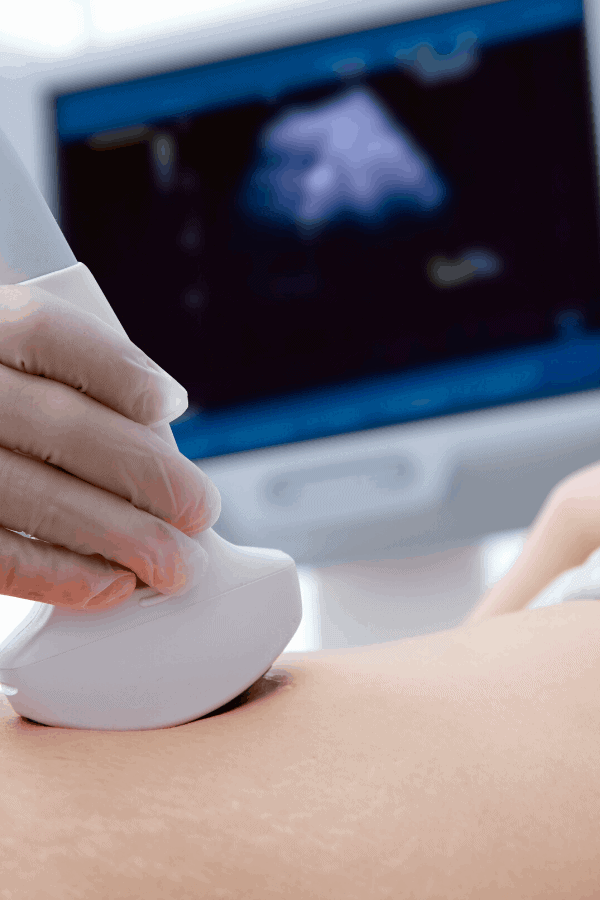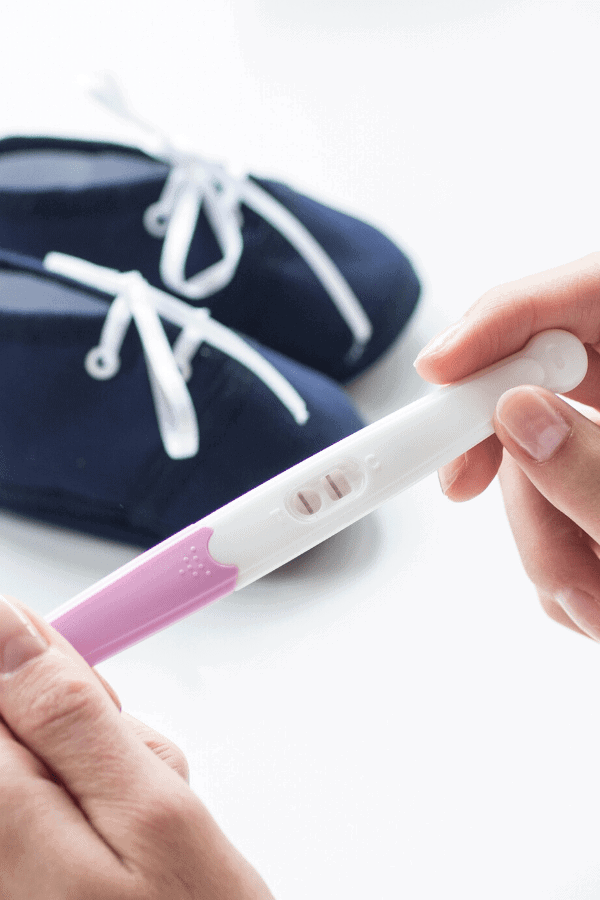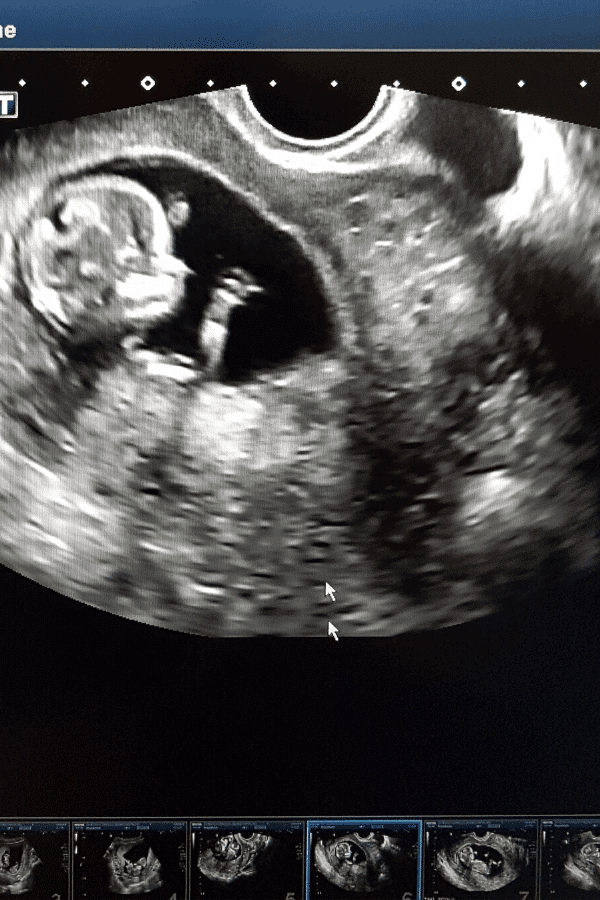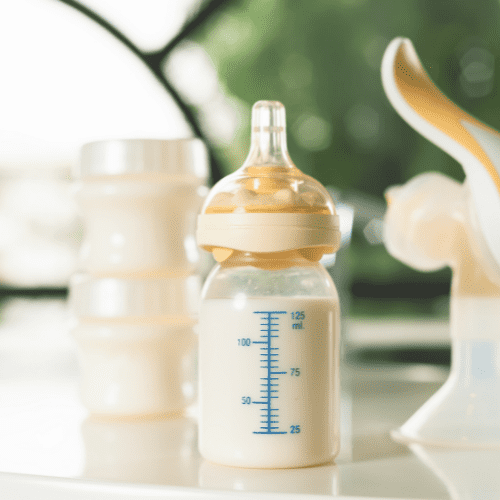What is Implantation?
Even though you don’t actually know whether you’re 100% pregnant until you see those two pink lines, your body might be giving you some signs and has been working hard since the moment of conception.
There’s a lot going on in your body but it all started with implantation. That’s when the signs and symptoms start to appear.
Your fertilized egg has successfully attached itself to the lining of your uterine wall, and that’s what implantation is.
It seems to be that a lot of people think that implantation is the fertilization of the egg, but your egg has actually been fertilized for about a week.
Once your egg has been fertilized, your body will begin to produce hCG (human chorionic gonadotropin) and this is what is picked up by pregnancy tests.
As an Amazon Associate I earn from qualifying purchases. The links below may be affiliate links. Please read my disclosure policy for more information.
[adthrive-in-post-video-player video-id=”VUNDGYeI” upload-date=”2022-03-22T14:21:20.000Z” name=”Signs and Symptoms of Pregnancy Implantation” description=”” player-type=”collapse” override-embed=”false”]
When does Implantation occur?
Implantation can happen anywhere from 6-10 days after conception. Although, it happens more regular around the ninth day. It could even happen as late as 12 days.
If you have a regular 28-day cycle and your ovulation happens on the 14th day after your period, your implantation is more likely to occur on the 23rd day.
Related: 25 Early Signs you are Pregnant before you take a pregnancy test!
Signs and Symptoms of Pregnancy Implantation
It’s the same as everything in regards to the signs and symptoms being different for everyone. Someone might have multiple symptoms, whereas someone else might not have any.
1. Cervical mucus
Due to the increase in progesterone levels once implantation has been successful, your cervix’s blood flow might increase due to the cervix swelling.
Cervical mucus is produced by the glands enlarging and the hormones stimulating. Your cervical mucus might even look brown or pinkish in color after implantation as the mucus will contain some blood.
2. Implantation bleeding or spotting
One of the most common symptoms of implantation, this happens when your embryo embeds itself into the uterine wall.
Implantation doesn’t form clots the same as period bleeding. It also Isn’t consistent but is pink in color.
If you have implantation bleeding then it can last from a few hours up to two days but may be on and off.

Related: Foods to avoid during pregnancy
3. Hot flushes
It is quite hard to identify, as they can only last up to 15 minutes at the time of implantation. You may suffer with hot flushes due to the hormone levels fluctuating rapidly.
This isn’t a consistent symptom but you might want to put it in association with the other symptoms you could feel.
4. Implantation cramping
This is very similar to period cramps; they just aren’t as painful. They will last for a couple of days, similar to period cramps and you are more likely to experience them in your lower abdomen and back.
If you seem to be struggling to deal with the cramps as they’re longer and feel more intense, you should go and see your doctor as soon as possible.
5. Food cravings/aversions
Your food/drink likes and dislikes will be altered due to the hormones that are produced in the body because of implantation.
Even if you haven’t tasted the food before, you might crave it. Or vice versa, you might dislike foods you once loved.
It’s bizarre, but you might even come across a non-food/drink item that you have a need to eat.
Related: The Hyperemesis Gravidarum diet that got me through my fifth pregnancy

6. Breast changes
Your body will begin to change pretty quickly after implantation, including your breasts. You might feel more tender or see some swelling.
This is completely normal and is because of the change in hormone levels in the body.
If you notice the change during ovulation, you will more than likely notice it the week after as well.
7. Frequent urination
There is an increase in blood supply to the pelvic area during the week of implantation, which will make you have the urge to urinate more frequently.
The increase will put pressure on your bladder, hence the urge!
Basal body temperature
You could determine pregnancy by measuring your basal body temperature (BBT) as it tends to increase during implantation.
This only works effectively if you’re trying to get pregnant, as It’s not otherwise common to check your temperature on a regular basis.
Your BBT will stay high during ovulation because of the heightened progesterone hormone and this will then stay high when implantation happens.
Related: 20 Amazing Pregnancy Superfoods That Actually Taste Delicious

What are stages of Implantation?
There are three different stages of implantation and it will occur on the sixth or seventh day after ovulation.
Stage 1: Your embryo will attach itself to the uterine wall and this is called adplantation. Your embryo will be about five or six days old at this stage.
Stage 2: Your fertilized egg will penetrate the uterine wall and secure itself to the uterus.
Stage 3: The embryo will move its way deeper into the uterine wall and the ovum will be in the endometrial cavity, so when the endometrium grows, the cavity will be wrapped better.
Confirmation of a successful Implantation
You can only really know if you’re pregnant by taking a test. So, if you do notice any of the above symptoms, you should wait at least three days until you take a home pregnancy test.
This will give you a more accurate reading, especially if you wait even longer as the hCG levels will increase.
You can also confirm implantation by making an appointment for a sonogram to see if the embryo is attached to the uterine wall.
Related: DIY Pregnancy Test
Are you having signs and symptoms but got a negative test result?
This could be because there is insufficient hCG hormones detected. It could take up to 10 days to have enough hCG in your body for the test result to show positive. So, just sit back, be patient and try and remain optimistic.
Improving your chances of Implantation
Your most fertile days are the four days before ovulation as well as the day itself.
You’re able to track when this occurs with an ovulation calculator or keeping a close eye on your signs and symptoms. During these days, you should be having unprotected sex as much as you can to enhance your chances.

You should also be following a healthy lifestyle:
1. Believe in yourself
It can be stressful trying for a baby, and you’ll want to enjoy it as well as trying to create the magic needed. If you at any point start to stress about the future (giving birth), then you should try and reassure yourself and cross that bridge when it comes to it.
Stress puts a LOT of pressure on your uterus (believe it or not) and that can automatically make it a chore for baby-making, when you still want to enjoy it. Negative thoughts will alter your hormone balance.
2. A balanced diet
This seems to be the answer for everything these days, but it’s true. Eating a more balanced and healthy diet will increase your chances of pregnancy.
• Foods that increase your body temperature due to the fact a warm womb is the perfect environment to support new life. So, start making stews and soups with herbs like cayenne, cinnamon and ginger.
• Your estrogen levels will be promoted if you start eating more fiber-rich foods. So, kale, beet greens, leafy greens, soaked seeds and nuts. Aim to have about 28 grams of fiber every day.
3. Take enough rest
We would all love to have extra rest time, but it is essential when you’re trying for a baby. You can easily avoid any stressful thoughts by sleeping it away. This will help in many different ways.
• Get a massage and spend time with your loved ones.
• Go to bed earlier and take naps throughout the day.
• Make a safe environment for your baby by nesting your womb.
• If you’re into vigorous exercises, try walking or fertility yoga instead.

What is abnormal implantation?
This is what happens when the implantation doesn’t happen in the uterine lining or when the placenta unfortunately doesn’t form properly.
It might even be a case where the implantation occurs normally, but the embryo that has formed might be abnormal.
Why does abnormal Implantation occur?
An abnormal implantation will lead to pregnancy loss, which unfortunately includes:
Problems with the placenta
It all depends on where the implantation has occurred and if the placenta is even slightly adversely affected, the pregnancy could come to a loss.
Any problems with the placenta can cause miscarriage early on, whereas if the placenta issues happen later on in the pregnancy, this could result in a pre-term birth, which does end up causing complications for both mother and baby.
Menstrual or Implantation cramps?
As previously stated, implantation cramps can start around the same time as period cramps would, so it can be difficult to identify which is which. Although, there are a few signs and symptoms which might help you with this struggle:
Accompanied implanted bleeding: If you see that you’re spotting but it’s way too early for your period then you might be experiencing implantation bleeding. This is okay and usually appears lighter and with a hint of brown in color. This is different from period bleeding as that is typically bright red.
The intensity of the cramps: Menstrual cramps are usually gradual but more intense for a lot of women, whereas implantation cramps are less aggressive and feel more like pulling or tugging.
Duration of cramps: Implantation will be complete after 3 days and this is when your cramps will stop as well. If you experience pains for a longer duration, it’s more than likely period related.

Relief from Implantation cramps
Any cramp can be uncomfortable, especially when you experience it from inside! Just remember, they only last for a maximum of 3 days. You shouldn’t have to take any pain medication with them either because they’ll be mild.
If you find that you do need some relief from the cramps, then try these:
Yoga: this helps to relax your body and mind and get your blood flowing which will ultimately relieve your pain.
Relax: this is sometimes easier said than done, but stress will only cause more discomfort and tension. Just sit back and engage in some relaxation techniques like deep breathing or meditation.
Change positions: if you just swap the position you’re in, this might help to alleviate the pain.
Take a warm bath: warmth helps to relax your body as well as the ligaments and muscles.
Stay hydrated: this can have so many different benefits but it can definitely help preventing cramps if you get the right amount of fluids pumping around your body.
Hot compress: if you’re unable to have a warm bath, you could try pressing a hot compress on the area that’s causing you discomfort.
Get a massage: make your partner useful by asking them to give you a nice back massage with warm cream or oil. Or, you could find a masseuse in your area.
Related: DIY Pregnancy Test
When to be concerned
It is normal to experience cramping in early pregnancy, but it could also indicate a serious issue in which you should get to the doctor as soon as you possibly can.
If you have persistent pain or the cramping is unbearable, and you have a positive test, also see your doctor.
It could be something simple like gas or your uterus growing, but you need to be safe rather than sorry and the pain could be a sign of an ovarian cyst, urinary tract infection, miscarriage, placental abruption or ectopic pregnancy.






